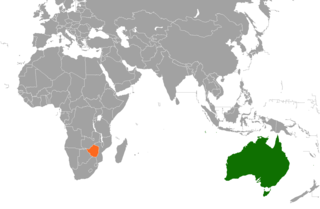The following outline is provided as an overview of and topical guide to meals:

A picnic is a meal taken outdoors as part of an excursion, especially in scenic surroundings, such as a park, lakeside, or other place affording an interesting view, or else in conjunction with a public event such as preceding an open-air theater performance, and usually in summer or spring. It is different from other meals because it requires free time to leave home.

The Bulletin was an Australian weekly magazine based in Sydney and first published in 1880. It featured politics, business, poetry, fiction and humour, alongside cartoons and other illustrations.

Edwin James Brady was an Australian journalist and poet.

Lionel Keith Murphy QC was an Australian politician, barrister, and judge. He was a Senator for New South Wales from 1962 to 1975, serving as Attorney-General in the Whitlam government, and then sat on the High Court from 1975 until his death in 1986.

Cooee! is a shout that originated in Australia to attract attention, find missing people, or to indicate one's own location. When done correctly—loudly and shrilly—a call of "cooee" can carry over a considerable distance. The distance one's cooee call travels can be a matter of competitive pride. It is also known as a call of help, distinct amongst the natural sounds of the bush.

Henry Bournes Higgins KC was an Australian lawyer, politician, and judge. He served on the High Court of Australia from 1906 until his death in 1929, after briefly serving as Attorney-General of Australia in 1904.

Airservices Australia is an Australian Government-owned corporation, responsible for providing services to the aviation industry within the Australian Flight Information Region (FIR). Some of Airservices Australia’s responsibilities include air traffic control, airway navigation, communication facilities, publishing aeronautical data, airport rescue, and fire-fighting services. Airservices Australia has international partnerships with ICAO, CANSO and IATA.

The Commonwealth Court of Conciliation and Arbitration was an Australian court that operated from 1904 to 1956 with jurisdiction to hear and arbitrate interstate industrial disputes, and to make awards. It also had the judicial functions of interpreting and enforcing awards and hearing other criminal and civil cases relating to industrial relations law.

The HR Nicholls Society is an Australian think tank that focuses on industrial relations. According to its website, the think tank “is a committed advocate for sensible industrial relations reform.”
Steelman and Smith are two fictional characters appearing in a series of short stories by Australian writer Henry Lawson.

John Wear Burton was an Australian public servant, high commissioner and academic.

In Australian, New Zealand, and Falkland Islands English, a smoko is a short, often informal break taken during work or military duty, although any short break such as a rest or a coffee or tea break can be called a smoko. Among sheep shearers in Australia, the smoko is a mid-morning break, between breakfast and lunch, in which a light meal may be eaten.

Sir George Stephenson Beeby KBE was an Australian politician, judge and author. He was one of the founders of the Labor Party in New South Wales, and represented the party in state parliament from 1907 to 1912. He fell out with the party and later served as an independent, a Nationalist, and a Progressive. He left parliament in 1920 to join the state arbitration court, and in 1926 was appointed to the Commonwealth Court of Conciliation and Arbitration. He was Chief Judge from 1939 until his retirement in 1941.

English Australians, also known as Anglo-Australians, are Australians whose ancestry originates wholly or partly in England. In the 2021 census, 8,385,928 people, or 33% of the Australian population, stated that they had English ancestry. It is the largest self-identified ancestry in Australia. People of ethnic English origin have been the largest group to migrate to Australia since the establishment of the Colony of New South Wales in 1788.

Foreign relations exist between Australia and Zimbabwe. Both countries have full embassy level diplomatic relations. Australia maintains an embassy in Harare, and Zimbabwe maintains an embassy in Canberra.
Lunch is a meal eaten around the middle of the day. It is commonly the second meal of the day, after breakfast, but before dinner, and varies in size by culture and region.

A jackaroo is a young man working on a sheep or cattle station to gain practical experience in the skills needed to become an owner, overseer, manager, etc. The word originated in Queensland, Australia, in the 19th century and is still in use in Australia and New Zealand in the 21st century. Its origins are unclear, although it is firmly rooted in Australian English, Australian culture and in the traditions of the Australian stockmen.

John Alexander Ferguson was a New Zealand-born Australian lawyer, judge, book collector, and author. He is best known for writing the seven-volume Bibliography of Australia, a guide to books published prior to 1901 in and on the topic of Australia. He also practised labor law and had a career as a judge in the Industrial Commission of New South Wales.















